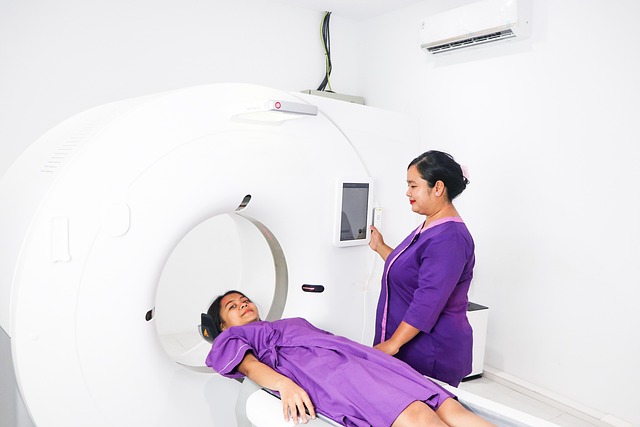Advanced imaging technologies like CT scans have revolutionized early cancer detection by identifying hidden tumors and metastasis across organs using X-rays and computer processing. Early detection through CT scans significantly improves treatment outcomes and survival rates for metastatic cancer patients, enabling precise diagnoses and targeted, less invasive treatments. However, challenges include misclassification of lesions, with ongoing research using algorithms and artificial intelligence aiming to enhance accuracy and patient outcomes.
“Uncover the power of whole-body scans in revolutionizing metastatic cancer detection. This comprehensive guide explores advanced imaging techniques, particularly CT scans, as early detection tools. Learn how these non-invasive methods offer a strategic approach to identify hidden tumors across the body. From understanding the technology behind CT scans to deciphering their benefits and potential challenges, this article provides insights for both medical professionals and interested folks seeking cutting-edge cancer care. Discover why CT scans are becoming indispensable in the battle against cancer.”
Understanding Whole-Body Scans for Cancer Detection
Whole-body scans, often facilitated through advanced imaging technologies like computed tomography (CT) scans, have emerged as powerful tools in the early detection and diagnosis of metastatic cancer. Unlike traditional methods that focus on a single area of concern, whole-body scanning provides a comprehensive view of the body, allowing healthcare professionals to identify hidden tumors or signs of metastasis that may be missed through conventional examinations.
CT scans for cancer involve using X-rays and advanced computer processing to generate detailed cross-sectional images of the body’s internal structures. This non-invasive procedure enables doctors to examine organs, bones, and lymph nodes, seeking any abnormal growths or suspicious areas that could indicate the presence of metastatic cancer. By detecting tumors at an early stage, whole-body scans play a crucial role in improving treatment outcomes and enhancing survival rates for patients facing this devastating disease.
CT Scan Technology and its Role in Early Detection
Computed Tomography (CT) scans have revolutionized cancer detection, particularly for metastatic cancer. This advanced imaging technology creates detailed cross-sectional images of the body using X-rays and computer processing. CT scanners can detect tiny abnormalities that might be missed by other methods, allowing for early identification of tumors or cancerous growths.
By providing high-resolution 3D visualizations, CT scans enable healthcare professionals to accurately visualize internal structures and identify suspicious areas. This technology is especially valuable in detecting metastases because it can reveal micro-lesions that may have been overlooked during physical examinations or other diagnostic processes. Early detection through CT scans significantly improves treatment outcomes and survival rates for patients with metastatic cancer.
Benefits of Early Metastatic Cancer Identification
Early identification of metastatic cancer through whole-body scans offers several significant advantages. One of the key benefits is improved treatment outcomes. When cancer is detected at an early stage, before it has had a chance to spread throughout the body, targeted and less invasive treatments can be more effective in eliminating the disease. This proactive approach allows for a better quality of life during and after treatment.
Additionally, CT scans for cancer enable healthcare professionals to make more precise diagnoses. By providing detailed images of the entire body, these scans help detect subtle changes or abnormalities that might be missed through traditional methods. Early detection can lead to quicker decision-making, allowing doctors to initiate appropriate treatment plans promptly.
Challenges and Future Prospects of Body Scanning Techniques
Despite significant advancements in medical technology, whole-body scans pose several challenges in metastatic cancer detection. One of the primary hurdles is balancing sensitivity and specificity. High-resolution imaging techniques like CT scans for cancer excel at identifying small lesions but often face difficulty distinguishing between benign and malignant growths, leading to potential false positives. This not only causes patient anxiety but also contributes to unnecessary invasive procedures.
Looking ahead, future prospects for body scanning techniques are promising. Researchers are exploring advanced algorithms and artificial intelligence (AI) to enhance the interpretation of imaging data, aiming to improve diagnostic accuracy. Integration of machine learning with CT scans could lead to more precise predictions of cancer spread, ultimately improving patient outcomes and streamlining healthcare processes.
Whole-body scans, particularly utilizing advanced CT scan technology, represent a significant advancement in metastatic cancer detection. By offering a comprehensive view of the body, these scans enable early identification of cancerous cells, enhancing treatment outcomes and survival rates. While challenges remain, ongoing research and technological advancements promise to make whole-body scanning an even more accessible and effective tool in the global fight against cancer. For individuals at risk or those seeking peace of mind, exploring this innovative approach could prove invaluable.
